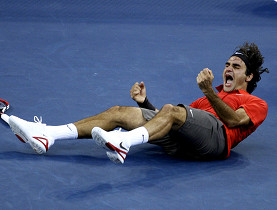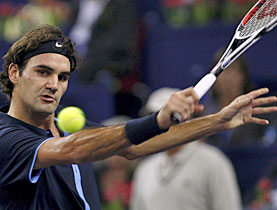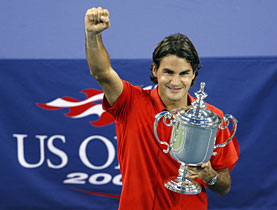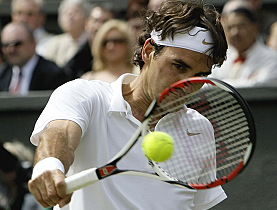Federer experiences year of highs and lows

By most people's standards Roger Federer has had an excellent year, winning the US Open and Olympic gold – not to mention $6 million (SFr7.2 million) in prize money.
But many commentators wondered whether 2008 marked the beginning of the end of the Federer era, pointing out that the 27-year-old Swiss had lost the tennis world number one ranking, his Wimbledon crown and the Masters Cup.
“It was obviously the most difficult year since his arrival at the top, but it could have been much, much worse,” René Stauffer, a sports journalist at Zurich’s Tages-Anzeiger newspaper and author of “Quest for Perfection: The Roger Federer Story”, told swissinfo.
In January Federer lost to Novak Djokovic in the semi-final of the Australian Open, an event he had won three times before. Andy Murray then upset him in the first round in Dubai, handing Federer his second loss in a row for the first time since 2003 and his first opening-round defeat since 2004.
Explaining his unusual vulnerability, Federer revealed in March he had suffered a bout of mononucleosis, or glandular fever, at the end of 2007.
Stauffer says this ruined Federer’s preparation and was the trigger for his loss of form, which culminated on August 18 in Spanish rival Rafael Nadal replacing him as world number one after a record 237 weeks.
“He lost his momentum, his confidence, respect – the other players realised he was beatable,” Stauffer said.
“But that alone wouldn’t have been enough [to lose the number one ranking] – his results were still okay. He would have remained number one had Nadal not started to win every tournament in late spring and summer,” he added.
“Nadal was almost unbeatable for half the year and he deserved the number one ranking. It wasn’t just that Federer lost it – Nadal won it.”
Paris and Wimbledon
Stauffer points out that Federer had a good season on clay – his least-favourite surface – winning at Estoril and reaching the finals in Monte Carlo, Hamburg and Paris.
“What didn’t work well were the hard courts. It was very disappointing to see him lose early to players he never used to lose to like Mardy Fish [at the Indian Wells Masters] or Andy Roddick [in the Miami Masters].”
Despite those hitches, Federer made it to the final of the French Open and Wimbledon to set up mouth-watering re-matches with Nadal.
Roland Garros was an anticlimax, to put it mildly. Federer, who had lost the previous two French Open finals to Nadal, won only four games in a three-set match, losing the final set 6-0. The last time Federer suffered a so-called “bagel” was in 1999.
Four weeks later however the crowd at Wimbledon got more than their money’s worth.
A victory for Federer would have meant his sixth consecutive Wimbledon title, breaking Björn Borg’s modern-era record. Nadal was looking for revenge after losing in the previous two finals.
Federer saved two match points in the fourth set tiebreak but eventually lost 6-4, 6-4, 6-7, 6-7, 9-7. The rain-delayed match ended in near darkness after 4 hours, 48 minutes of play, making it the longest men’s final in Wimbledon history. The defeat also ended Federer’s 65-match winning streak on grass.
“It certainly hurt him for the first few days afterwards. He was crying after the match and he was a little down for a while,” Stauffer said.
“But when he came to New York, something strange happened: people weren’t talking as if Roger had lost, they were saying what a match! That helped Roger tremendously to get over the Wimbledon loss.”
Golden boys
In August Federer was chosen to carry the Swiss flag at the Beijing Olympics, where he suffered a shock quarterfinal defeat in the singles to James Blake, to whom he had never previously lost.
A few days later however Federer finally won his first Olympic gold medal when he and Stanislas Wawrinka – who should take a bow for briefly breaking into the top ten in 2008 – unexpectedly won the doubles title.
In September Federer’s good form continued and he helped Switzerland gain promotion in the Davis Cup. He also defeated Andy Murray in New York to win his 13th grand slam title and become the first player in history to have five consecutive victories at both Wimbledon and the US Open.
In October Federer set another record when he overtook Pete Sampras’s total career winnings of $43,280,489, although Sampras’s record 14 grand slam titles is Federer’s real target.
But Federer’s year ended with disappointment in November when he lost two of his three group matches in the Masters Cup and failed to qualify for the semi-finals. He had won the event in 2003, 2004, 2006 and 2007.
Despite a mixed year, Stauffer thinks Federer will look back on 2008 and be happy. “He knows how difficult it was to get his fitness going again. He won Olympic gold and the US Open – those two things will remain in his memory.”
What next?
Looking ahead, a recent swissinfo poll found that two-thirds of readers didn’t think Federer would regain the number one position in 2009.
“I’m slightly surprised by that,” Stauffer said. “But I don’t really mind if he’s number one or not. What I care about more is whether he wins another slam or two. Beating Sampras’s record – that’s what it’s all about now.”
He says Melbourne is going to be one of the most interesting grand slams for a long time and the winner there will set the tone for the whole season.
“For me it’s an open race, but I’m pretty confident that if Federer’s fit, he could win his fourth Australian Open. He would then have a great chance of beating Sampras’s record at Wimbledon.”
The bookmakers once again make Federer favourite to win the Australian Open, but this time only fractionally ahead of Nadal, who is clear favourite in Paris. The bookies can’t separate the two for Wimbledon, but they make Federer slight favourite for the US Open.
However, with a hungry Murray snapping at both players’ heels and an unpredictable Djokovic having just lifted the Masters Cup, the only thing worth betting on for 2009 is another year of sweat and tears – for players and fans alike.
swissinfo, Thomas Stephens
Crunching the 2008 numbers, Federer was more dangerous as a server than returner. He won 89 per cent of his service games (third overall – Andy Roddick won 91 per cent) compared with 27 per cent of return games (tenth – Nadal won 33 per cent).
Federer won only 66 per cent of tie-breaks (David Nalbandian won 81 per cent) but no one saved more breakpoints than the Swiss and his 8.68 aces per match (695 over 80 games) were a personal record and third-highest overall (the 208cm Ivo Karlović powered down a massive 961 aces in just 54 matches).
Against top ten players Federer won seven matches but lost ten – although this included four finals against Nadal.
But as someone once said, statistics, like bikinis, show a lot but not everything. In the most important lists – world ranking, match balance, prize money – only Nadal is ahead of Federer.
Federer won $5,886,879 (SFr7,160,000) in prize money versus Nadal’s $6,773,773. Federer won a total of 66 matches and lost 15 (81.5 per cent win rate) versus Nadal’s 82:11 (88.2 per cent).
Federer will start the year on hard courts at an invitation tournament in Abu Dhabi then play events at Doha, Qatar, and Kooyong, Australia, before the Australian Open starts on January 19 in Melbourne.
Federer will play only two clay-court tournaments in 2009 before the French Open, the only grand slam tournament he has never won. He will head to Paris on May 24 after playing Masters series events on his least-favourite surface in Rome and Madrid. He played four clay-court events in 2008 ahead of the French Open – Estoril, Monte Carlo, Rome and Hamburg.
His grass-court schedule is unchanged with a single warm-up for Wimbledon, which starts on June 22, at Halle in Germany.
Federer will defend his US Open title from August 31 after playing Masters events on hard courts at Montreal and Cincinnati.

In compliance with the JTI standards
More: SWI swissinfo.ch certified by the Journalism Trust Initiative




You can find an overview of ongoing debates with our journalists here. Please join us!
If you want to start a conversation about a topic raised in this article or want to report factual errors, email us at english@swissinfo.ch.